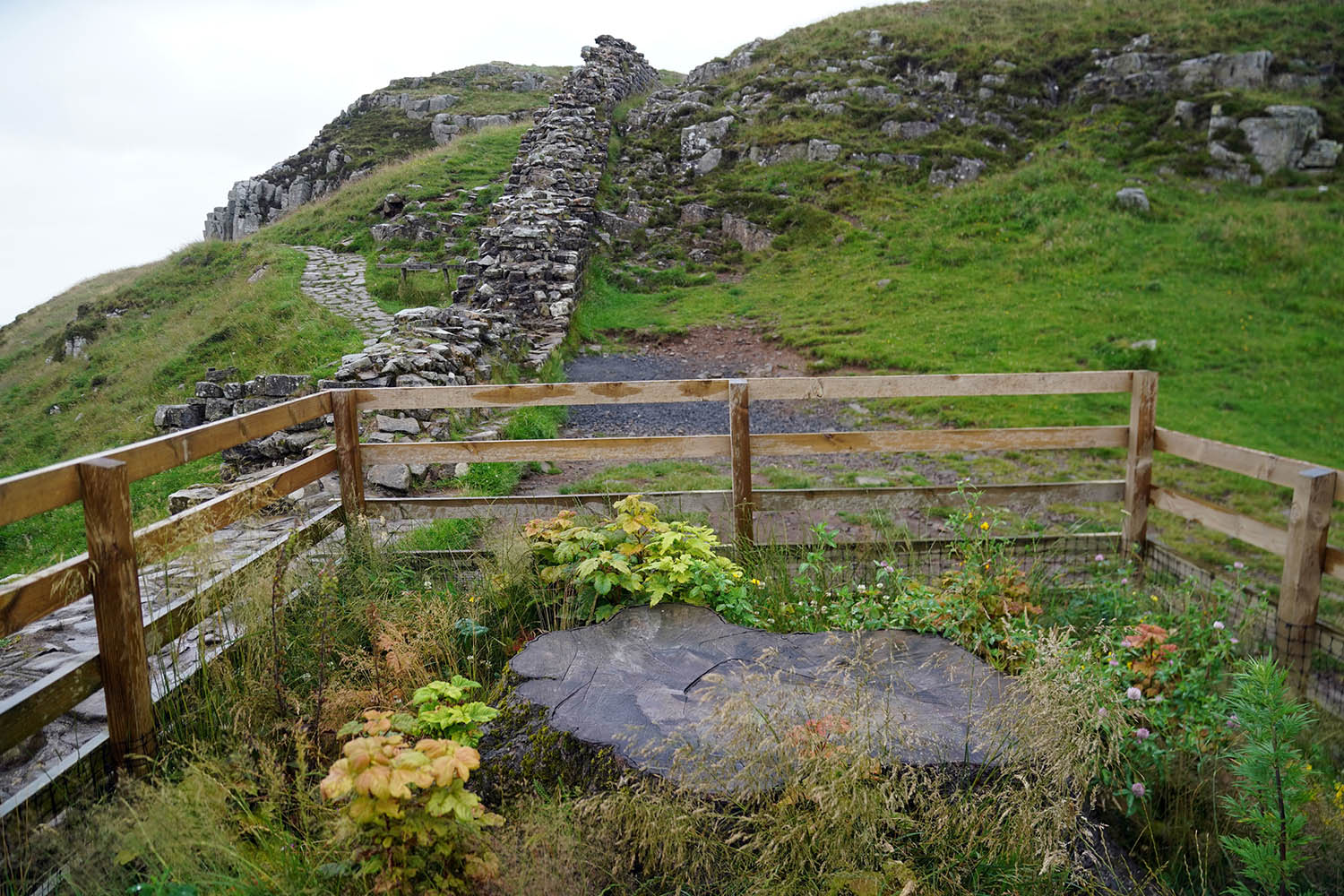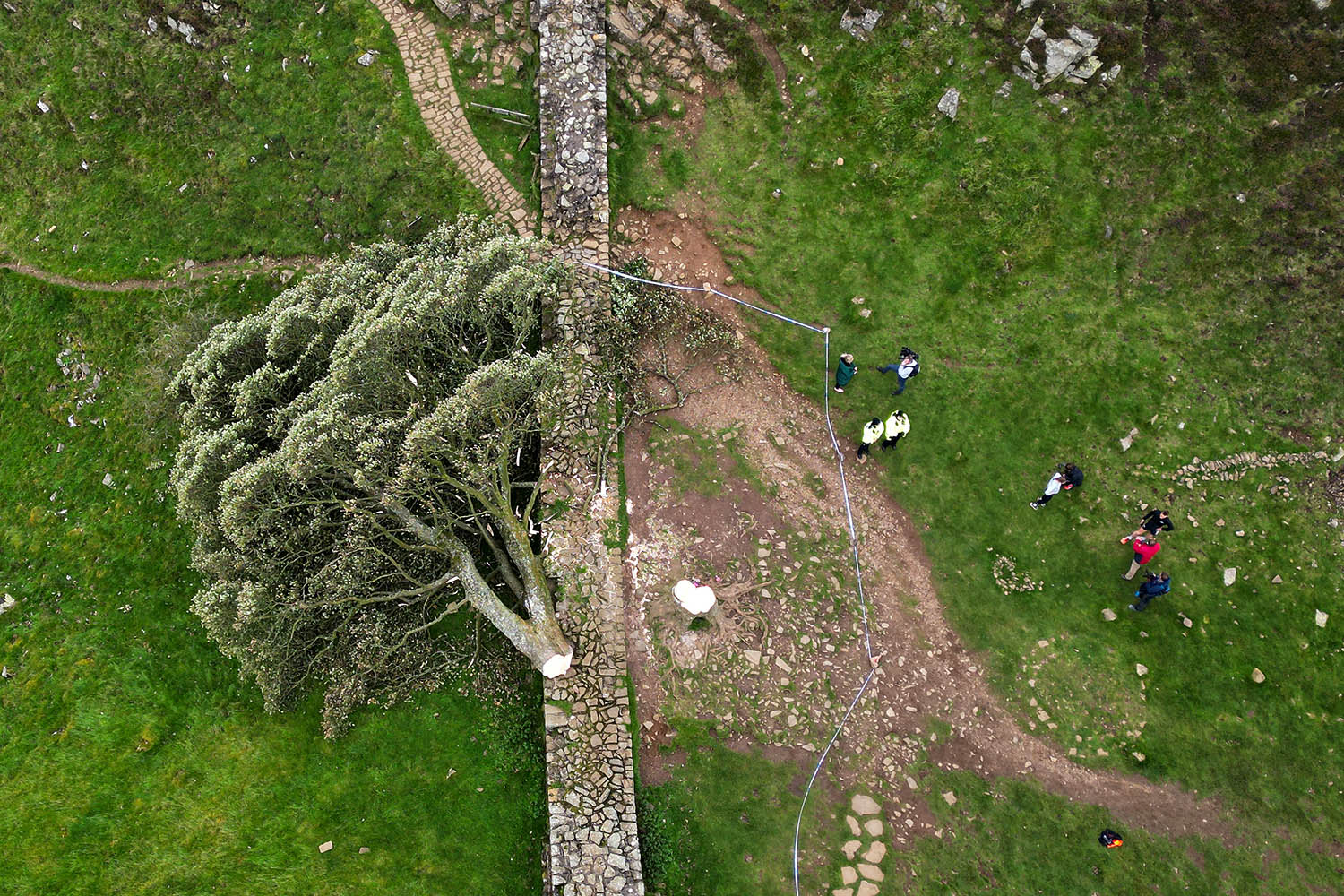The National Trust’s impact statement included three photographs. One showed the “Sycamore Gap Celebration Room” at a visitor’s centre near where the tree was felled. People had been invited to write “a memory” about the tree and stick it to the wall. Some people had left poetry – “Regional flag, Arboreal angel” – and others wrote messages on Post-It notes.
On one Post-It note, someone wrote: “Forgive them Father for they know not what they do.”
Below it someone replied: “Yes they do. Some people are just wired up wrong.”
Were they just wired up wrong? Adam Carruthers and Daniel Graham denied felling the tree at Sycamore Gap during their trial in May, so we were given no reason for why it was done. Having been found guilty, we heard yesterday that they have admitted to probation officers that they did it, yet we still have no reason.
During their sentencing at Newcastle Crown Court yesterday, the National Trust’s statement was read out by prosecution barrister Rebecca Brown to help Mrs Justice Lambert decide how long the pair should spend in prison. The National Trust owns the land the tree was on and their statement seemed designed to represent the “victims” of the felling – which is all of us – but it was an odd experience listening to it.
It started by describing the significance of the tree – “a place of sanctuary” – then the effect on the Trust, including removing the tree, protecting the stump, answering media inquiries, launching memorial projects and producing online content: “Instagram reach was +2,122% on average.” The statement said staff experienced “increased workloads and additional stress”. Visitor numbers rose “almost in pilgrimage”.

Daniel Graham, left, and Adam Carruthers
Some of the workload felt of the Trust’s own making. But it was when Brown read out some of the public responses included in the statement that I wrote in my notes: “COMPLETE MADNESS”. One person wrote: “Really shocked and horrified by what’s happened. Thinking of you all – you must be devastated. Like losing a close family member.” “My heart actually hurts” wrote another. “Just WHY?” asked someone else. That last one was a fair question.
Despite confessing, neither men has given a reason. Carruthers said he was drunk, which the judge rejected. Graham, 39, said he just went along with it. The judge said there were “grains of truth” in their confessions, but it was not the whole story. She suspected they did it at least partly due to “sheer bravado” and the “thrill” of the outrage.
When I wrote about the case previously, I focused on the suicide of Graham’s dad in 2021. At the sentencing his barrister described him as a “troubled man”. The judge remarked: “You had a turbulent childhood, suffering physical and mental abuse from your mother. You had a close and supportive relationship with your father, however, and his suicide in 2021 affected you profoundly.
“Dr Ramplin explains that you have experienced mental health problems throughout your adult life and those problems have included depressive episodes of marked severity. Since your father’s death, you have attempted to take your own life on a number of occasions, most recently in December 2024 when you required treatment, including treatment in the ITU, for several weeks.”
Someone who knew Graham as a child got in touch with me recently. They said: “He was difficult and troubled but his father kept a very close eye on him and it was clear that they were very close. I suspect his father’s suicide would have been very difficult for him even as an adult. I liked his father a lot, he was very sensible and reasonable.” We need our dads.

Signs of growth at the base of the Sycamore Gap
Graham’s depression was not taken into account during sentencing as it was in remission. The judge did take into account the fact the pair knew that others were arrested and investigated for the felling, including a teenage boy, but still did not come forward. That got their sentences increased.
Graham had previous convictions for battery and public order offences, linked to what the judge called “relationship difficulties”, but which were not considered relevant and had resulted in financial penalties. Carruthers, 32, had no previous convictions. Both were given a “modest discount” for no previous relevant convictions to ensure their sentences matched.
Carruthers has two children and was described as “an active care-giver”. A pre-sentence report said he showed “emerging remorse” but was still struggling recognise the effect of what he did on others. He told a probation officer he had drunk a bottle of whisky after a tough day and everything was a blur that night. The judge said the tree was felled with such skill it wasn’t plausible that he was as drunk as he claimed.
Throughout the sentencing both men stared ahead, not looking at each other, rarely looking at anyone else, just as at the trial. When the judge told them to stand up, they did, respectfully, Carruthers in a camouflage T-shirt, Graham in a plain white shirt. They did not respond nor seem surprised as she gave them four years and three months each. They will be released no later than 40 per cent of the way through their sentences.
There was little reaction in the courtroom. Carruthers had two friends there but, it seemed, no family. Graham had nobody. There was global interest in the story. The Washington Post sent a reporter, journalists spilled out of the press benches into seats usually reserved for the jury, and it was broadcast by Sky News. I’ve been told a play and documentary are planned. I expect they will be premature: the most revealing part of the story will be what happens to the two men after prison.
Read Andrew Hankinson’s coverage of the trial here.
Photographs by Jeff J Mitchell/Getty, Owen Humphreys/PA, Northumbria Police
Newsletters
Choose the newsletters you want to receive
View more
For information about how The Observer protects your data, read our Privacy Policy



